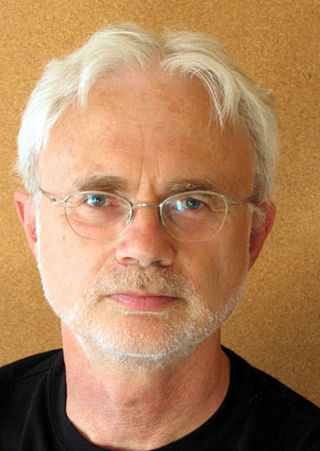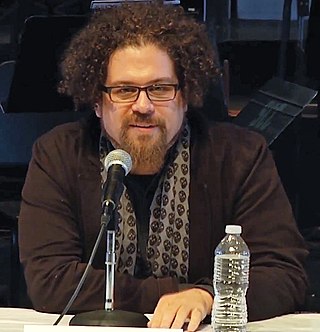Related Research Articles
Osvaldo Noé Golijov is an Argentine composer of classical music and music professor, known for his vocal and orchestral work.
Dawn Upshaw is an American soprano. She is the recipient of several Grammy Awards and has released a number of Edison Award-winning discs; she performs both opera and art song, and her repertoire spans Baroque to contemporary. Many composers, including Henri Dutilleux, Osvaldo Golijov, John Harbison, Esa-Pekka Salonen, John Adams, and Kaija Saariaho, have written for her. In 2007, she was awarded a MacArthur Fellowship.
Mariana Pineda is a play by the Spanish playwright and poet Federico García Lorca. It is based on the life of Mariana de Pineda Muñoz, whose opposition to Ferdinand VII had become part of the folklore of Granada. The play was written between 1923 and 1925 and was first performed in June 1927 at the Teatre Goya in Barcelona. That production was directed by García Lorca, with scenic design and costumes by Salvador Dalí, and was performed by the company of Margarida Xirgu. The play received its Madrid première that October, at the Teatro Fontalba.

Mass is a musical theatre work composed by Leonard Bernstein with text by Bernstein and additional text and lyrics by Stephen Schwartz. Commissioned by Jacqueline Kennedy, it premiered on September 8, 1971, conducted by Maurice Peress and choreographed by Alvin Ailey. The production used costume designs by Frank Thompson. The performance was part of the opening of the John F. Kennedy Center for the Performing Arts in Washington, D.C. Mass premiered in Europe in 1973, with John Mauceri conducting the Yale Symphony Orchestra in Vienna.

Margarita Xirgu Subirá, also Margarida Xirgu, was a Spanish stage actress, who was greatly popular throughout her country and Latin America. A friend of the poet Federico García Lorca, she was forced into exile during Francisco Franco's dictatorship of Spain, but continued her work in America. Notable plays in which she appeared include Como tú me Deseas, La casa de Bernarda Alba, and Mariana Pineda.
Robert Spano is an American conductor and pianist. He is currently music director of the Fort Worth Symphony Orchestra, music director of the Aspen Music Festival and School, principal conductor of the Rhode Island Philharmonic Orchestra, and music director laureate of the Atlanta Symphony Orchestra (ASO).

El Niño is an opera-oratorio by the contemporary American composer John Adams. It was premiered on December 15, 2000, at the Théâtre du Châtelet in Paris by soloists Dawn Upshaw, Lorraine Hunt Lieberson and Willard White, the vocal ensemble Theatre of Voices, the London Voices, La Maîtrise de Paris, and the Deutsches Symphonie-Orchester Berlin, with Kent Nagano conducting. It has been performed on a number of occasions since, and has been broadcast on BBC Television.
Amanda Forsythe is an American light lyric soprano who is particularly admired for her interpretations of baroque music and the works of Rossini. Forsythe has received continued critical acclaim from many publications including Opera News, The New York Times, The Wall Street Journal and the Boston Globe.
David Bruce is a British composer and a YouTuber.
John Aler was an American lyric tenor who performed in concerts, recitals, and operas. He was particularly known for his interpretations of the works of Mozart, Rossini, Donizetti, Bellini, and Handel.
Jessica Rivera is an American soprano of Peruvian-American ancestry.
José Lemos is a Brazilian countertenor.

David Patterson is an American guitarist. He was the founding member of the New World Guitar Trio and is recognized as a solo performer and arranger.
Kelley O'Connor is an American singer. She earned her Bachelor of Music degree from Thornton School of Music at the University of Southern California and her master's degree in Music from the University of California, Los Angeles.
The Atlanta School of Composers is a group of contemporary classical music composers championed by Atlanta Symphony Orchestra and conductor Robert Spano through performances, recordings, and commissions. Members of the group include Jennifer Higdon, Christopher Theofanidis, Osvaldo Golijov, and Michael Gandolfi, with Adam Schoenberg added in June 2010. Works from the group including the following:

David T. Little is a Grammy-nominated American composer, record producer, and drummer known for his operatic, orchestral, and chamber works, most notably his operas JFK,Soldier Songs, and Dog Days which was named a standout opera of recent decades by The New York Times. He is the artistic director of Newspeak, an eight-piece amplified ensemble that explores the boundaries between rock and classical music, and is the Chair of the composition faculty at Mannes School of Music.
Paula Murrihy is an Irish operatic mezzo-soprano who has made an international career. A member of the Oper Frankfurt, she has appeared also in Europe and the US, including the Metropolitan Opera and the Santa Fe Opera.
Ayre is the twelfth album by composer Osvaldo Golijov, it is a cycle of songs commissioned by Carnegie Hall for soprano Dawn Upshaw, which offers a tour of the Mediterranean, particularly in that mixture of Spanish, Jewish and Arabic influences that once coexisted quietly in Spain before the Reconquista.
A number of works have been based on, have been inspired by, or have alluded to the works of Spanish poet, playwright, and theatre director Federico del Sagrado Corazón de Jesús García Lorca.
References
- ↑ "Ainadamar". osvaldogolijov.com. Retrieved 17 September 2022.
- ↑ "Osvaldo Golijov: Ainadamar - Atlanta Symphony Orchestra, Robert Spano | Credits | AllMusic". AllMusic .
- ↑ "Ainadamar". Detroit Opera . Retrieved 17 September 2022.
- ↑ Lunden, Jeff. "Composer Golijov Tries Opera with 'Ainadamar'". All Things Considered . NPR . Retrieved 17 September 2022.
- ↑ "Teatro Real:Ainadamar" . Retrieved 9 July 2012.
- ↑ "2012-13 Season" Archived 2014-11-02 at the Wayback Machine , on quantumtheatre.com
- ↑ Smith, Rowena. "Ainadamar review – vibrant and deft production brings Golijov's opera to the UK". The Guardian . Retrieved 5 November 2022.
- ↑ "Osvaldo Golijov: Ainadamar - Fountain of Tears, details of the recording on deutschegrammophon.com